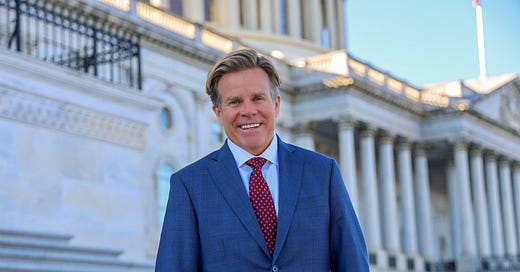
Kamala Harris gave away the election on September 29 — you can write it down.
Since her palace coup ousted Joe Biden following his addled debate debacle, Harris has brazenly positioned herself as a change agent in a change election. But what’s holding her back is a sense that she has neither the strength nor the political quick-twitch muscle to be a dexterous Commander in Chief — traits even President Donald Trump’s detractors, at least the sane ones, readily attribute to the Orange One.
The inundation of the Appalachian Mountains by Hurricane Helene in the last week of September provided Harris with a golden opportunity to disprove both those deficiencies, and shift the key question of the race fully onto friendlier territory. Had she demonstrated strength and dexterity in a real-time crisis, the voters’ attention would have more likely slid to focus on Trump’s shortcomings.
This would have been simple for a sitting Vice President to do, and the template is well-established by hurricane-state governors in both parties. As soon as the storm passes, smart governors set up command posts and do daily briefings with reporters, taking questions until there are none. They are fully transparent about minute daily remediation activities and pound the media with statistics. They provide detailed accounts of both rescue outcomes and ongoing challenges, and project future recovery objectives. They’re candid about what they know and don’t, what they can do, and can’t. They instill confidence in the competence of government’s ability to meet challenges of crises that are insurmountable for individuals.
After Hurricane Helene wrecked Florida’s Big Bend, the storm parked over the mountains of Georgia and North Carolina, dumping four months’ worth of rain in just two days. Narrow, already-swollen mountain stream beds were no match for the deluge. Catastrophic flash flooding followed, cutting Asheville off from the rest of the world, and rendering mountain hamlets uninhabitable. The death toll still climbs as the search for human remains continues.
It is debatable whether or not the federal response to Helene’s flooding has been insufficient or typical — but what is beyond debate is that Harris passed on putting on the uniform of command she had available.
A Vice President more confident in her ability to present executive skills would have immediately set up a command post at the National Guard building at the end of the airport runway in Asheville. She’d have put on a FEMA windbreaker, and wiped her calendar clean of campaign events, devoting full attention to overseeing the response to Helene for as long as it took. National journalists would have been present every day, and they’d have been too ashamed to ask her about immigration, the Middle East war, her newly revealed affinity for firearms, or any of the other questions she’s found tricky.
Instead of merely staging phone calls for photo-ops to affected localities, she could have been on the ground doing the work of governing while her challenger, Trump, was just talking and campaigning. Her leadership would have become a shared American campaign against punishing despair, lending it an elusive and authentic purpose even her craven ambition could not suppress.
It also would have solved her electoral college puzzle. Since her debate with Trump on September 11, Harris has led in many national polls, but her Electoral College chances look iffy, as her prospects in Pennsylvania and Michigan seem to be waning. Shaky polls of Rust Belt states full of inflation-rattled, non-college voters — the exact cohort to whom Harris seems most mismatched — have smart Democratic operatives shifting their strategic eyes southward lately, to Georgia and North Carolina. In fact, a southern strategy may be her only plausible path.
Geographically, Helene’s high waters correspond exactly with a Harris route to victory. In 2020, Biden lost the 14 western counties in North Carolina hardest hit by Helene by a net of 63,385 votes. He lost other adjacent flood-affected mountain counties by 170,631 votes. Biden won the rest of North Carolina by 159,533. A Vice President Harris who had showed up immediately, took command decisively, and presided unceasingly, could have turned enough hill dwellers to flip North Carolina — and with it the Electoral College — without having to sweep the crumbling “blue wall” states in the Great Lakes.
As a sixth-generation native of the southern highlands, I can tell you that my people are far more connected to each other than they are to any party, politician, or ideology. As contrarian descendants of Scotch-Irish stock, we love zigging when others expect us to zag. It’s why the mountaineers thumbed their noses at the dominant lowland planters to oppose secession in 1861, and why we don’t care that we’re the butt of Hollywood’s jokes today.
Kamala Harris is flawed and flimsy. Her shallows are why she’s struggling against an opponent who is undeniably strong, but still viewed unfavorably by a majority of Americans. She may yet win North Carolina and with it the presidency, but she’s missed her best chance to do so.
What the Vice President has not been doing this last week tells America what she cannot do. Voters have surely noticed.
Brad Todd is a partner at OnMessage. His clients have defeated six incumbent U.S. Senators, leading the industry. He’s helped elect four governors and over two dozen congressmen and now provides strategic and messaging advice to leading national commercial brands, sports teams, and foundations. Todd is the co-author of a The Great Revolt, a Washington Post best-selling book about the current realignment underway in American politics.










